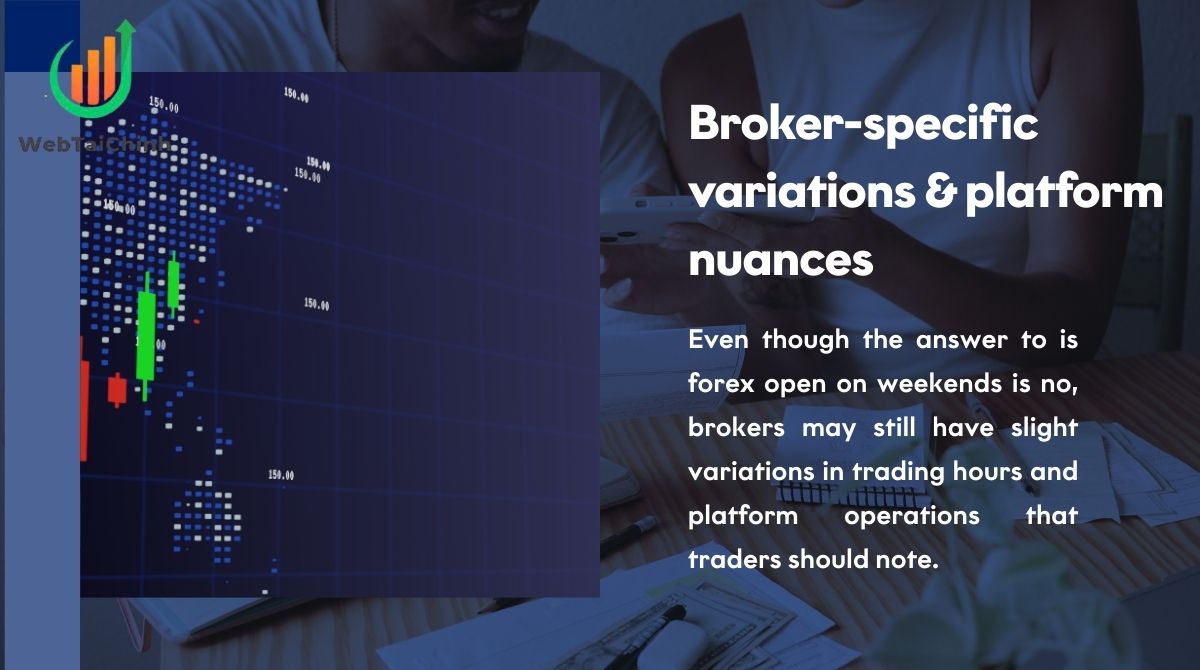Physical Address
304 North Cardinal St.
Dorchester Center, MA 02124
Physical Address
304 North Cardinal St.
Dorchester Center, MA 02124

The foreign exchange (forex) market is the global marketplace for trading currencies, known for its vast liquidity and 24-hour access during weekdays. Operating continuously from Sunday evening to Friday evening (typically 5:00 pm ET), it allows traders worldwide to buy and sell currencies almost nonstop throughout the week.
However, a common question among both new and experienced traders is: Is forex open on weekends? Understanding forex trading hours is crucial for planning trades, managing risks, and adapting strategies to different market conditions.
This article delves into forex market hours, weekend closures, exceptions offered by some brokers, associated risks like weekend gaps, and timezone variations. It also covers best trading times during global sessions and nuances from brokerage platforms. The forex market’s operation hinges on the coordinated activity of major banks and institutional liquidity providers, which shape trading opportunities across timezones from New York to Sydney.
For example, forex officially opens Sunday at 5:00 pm Eastern Time and closes Friday at 5:00 pm ET, but converting these times to local timezones can be challenging without context. This guide will clarify these details to help traders optimize their timing and risk management.
Key takeaways:
No, the forex market is closed to retail traders on weekends.

| Timezone | Market Close (Friday) | Market Open (Sunday) |
| ET (New York) | 5:00 pm | 5:00 pm |
| GMT/UTC | 10:00 pm | 10:00 pm |
| CET (Europe) | 11:00 pm | 11:00 pm |
| AEST (Australia) | 1:00 am Sat | 1:00 am Mon |
When asking is forex open on weekends, it’s also important to know how market hours shift across timezones and daylight saving changes.
| Timezone | Market Open (Sunday) | Market Close (Friday) | Daylight Saving Notes |
| ET (New York) | 5:00 pm Sun | 5:00 pm Fri | Switches mid-March to early November; affects trading hour conversions |
| GMT/UTC | 10:00 pm Sun | 10:00 pm Fri | No DST change |
| CET (Europe) | 11:00 pm Sun | 11:00 pm Fri | Starts late March to late October; shifts offset by one hour |
| AEST (Australia) | 1:00 am Mon | 1:00 am Sat | Starts early October to early April; can cause offset confusion |
The forex market’s 24/5 availability translates differently across global timezones, influenced heavily by daylight saving time (DST) changes. For example, when the U.S. switches to DST but Europe has not yet, an “offset confusion” occurs where the time difference shifts temporarily, potentially causing traders to miss session openings or closings if unprepared.
To avoid errors, traders should always confirm market hours relative to their local clock during DST transitions. For instance, a trader in London might find the forex market opening at 11:00 pm local time during European winter but shifts to 10:00 pm during European summer when DST applies.
The forex market closes on weekends mainly because major banks and financial institutions, the backbone of the interbank forex market, are closed, which ties directly to the greatest risk associated with forex settlement.

Forex trading operates through a global network of banks, where liquidity and price discovery depend on their activity. When these banks close, there is no significant institutional trading or order flow, effectively halting meaningful market movements.
Think of it like the stock market closure on weekends but on a global scale: the forex market pauses because its key contributors are offline.
The “weekend gap” refers to the price difference that can occur between the Friday market close and Sunday market open. Because no trading takes place during the weekend, any major news or geopolitical events cause price jumps or gaps at the Sunday open, which may pose risks for traders holding positions over the weekend.
Typical weekend gap risks include:
To manage weekend gap risk, traders should:
Real-world examples include the Brexit referendum weekend gap in 2016, where GBPUSD experienced a sharp price jump at Sunday open, or sudden geopolitical events impacting currency pairs. Awareness and preparation are key for mitigating these risks.
While the answer to is forex open on weekends is no, knowing the most active forex trading sessions during weekdays helps traders capture volatility effectively.
| Session | Active hours (ET) | Currency focus | Notes |
| Sydney | 5:00 pm – 2:00 am | AUD, NZD | Lower volatility; good for carry trades |
| Tokyo | 7:00 pm – 4:00 am | JPY, Asian pairs | Moderate volatility; important for Asian news |
| London | 3:00 am – 12:00 pm | EUR, GBP, CHF | High volatility; overlaps with Tokyo and New York sessions |
| New York | 8:00 am – 5:00 pm | USD, CAD | Most volatile; overlaps with London for peak action |
The best trading times are often when sessions overlap, such as London/New York (8:00 am to 12:00 pm ET), where liquidity and volatility surge especially during which forex news event have the largest moves. This is ideal for traders seeking quick price movements. Session choice depends on strategy; scalpers favor high volatility periods, trend traders may prefer full sessions with directional momentum, and breakout traders watch session openings and economic releases.
For example, the EUR/USD pair is especially active during London and New York matching hours, while JPY cross pairs primarily move during Tokyo and Sydney sessions.
Even though the answer to is forex open on weekends is no, brokers may still have slight variations in trading hours and platform operations that traders should note.

For example, Broker A may close forex trading at 5:05 pm ET, while Broker B strictly closes at 5:00 pm ET, affecting last-minute orders. During daylight saving changes, brokers adjust their timing but may not all do so simultaneously.
While traditional forex markets close on weekends, some brokers offer synthetic or weekend forex products. These markets provide limited currency pairs with separate pricing mechanisms and settlement rules that differ from the weekday spot forex market.
Key features of synthetic weekend forex include:
| Feature | Regular forex | Weekend synthetic forex |
| Trading Hours | 24 hours Mon–Fri | Limited hours Sat/Sun (varies by broker) |
| Spreads | Tighter spreads | Wider spreads |
| Instruments | Hundreds of pairs | Few pairs only |
| Settlement | Standard FX settlement | Separate settlement, no carryover |
Before trading weekend forex, always read contract specifications and understand how price feeds are sourced. Be aware of higher volatility and risks of price gapping when the regular market opens Sunday evening ET.
To confidently trade forex, converting market hours to your local time is essential. Follow these steps:
For example, if you are in Berlin:
Using online time conversion tools or forex session clocks can further simplify this process.\
Read more:
| Market | Weekend trading | Comments |
| Stock market | Closed | Typically close Fri PM to Mon opening |
| Forex market | Closed (retail) | Open 24/5; closed weekends; some synthetic weekend FX |
| Crypto market | Open 24/7 | No centralized closure; active all weekend |
| Commodities | Usually closed | Follow exchange schedules; generally closed weekends |
Forex is open 24 hours a day but only from Sunday evening to Friday evening, not on weekends.
It depends on your local timezone; convert from ET’s 5:00 pm Sunday opening time.
Yes, but be aware of weekend gap risks and potential price jumps at market open.
Pending orders activate at market open but might execute at different prices due to gaps.
Usually yes; many brokers offer 24/7 crypto trading but indices often follow different schedules.
Synthetic markets have separate pricing, wider spreads, limited pairs, and no position carryover.
No; brokers may have slight variations and some offer weekend synthetic products while others don’t.
Forex’s weekend closure contrasts sharply with crypto markets, which operate continuously. Unlike stocks and commodities, which shut down during weekends, digital assets offer uninterrupted trading, underscoring forex’s reliance on the traditional banking system.
In summary, understanding forex trading hours is essential for planning your strategies and avoiding unnecessary risks. If you’ve ever asked yourself “is forex open on weekends”, the answer is no for the traditional market but knowing the exceptions, risks, and best trading times during the week can make all the difference. For more clear and practical guides on trading and finance, visit webtaichinh to stay informed and trade with confidence.
Web Tai Chinh is a portal that updates news and information related to finance quickly and accurately, helping users have an overview before investing, clearly understanding concepts and terms related to Finance. Explore more insights in our Forex category, start your FX trading journey today with the right partner for long-term success.
📞 Contact: 055 937 9204
✉️ Email: webtaichinhvnvn@gmail.com
📍 Address: 13 Ho Tung Mau, An Binh, Di An, Binh Duong